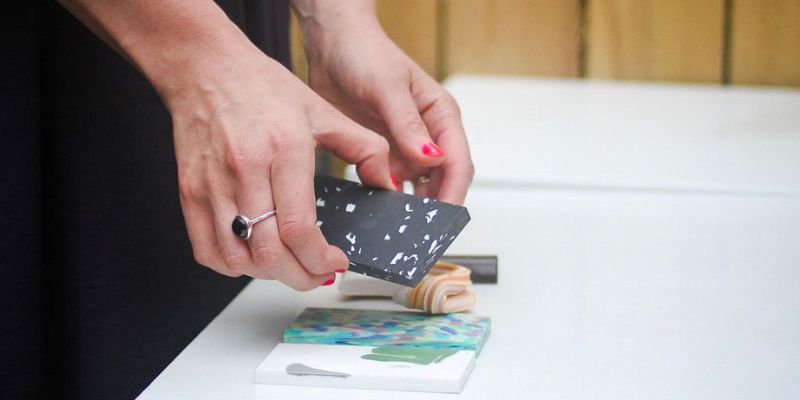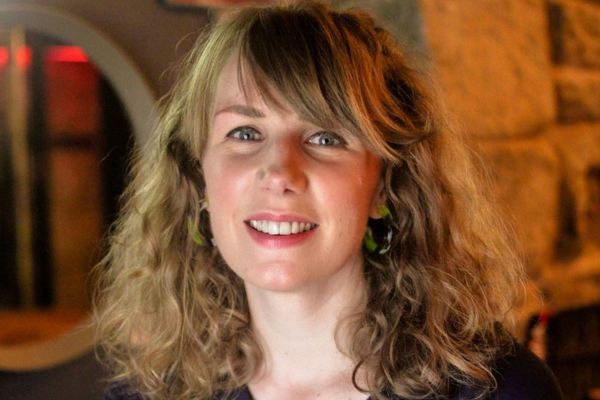Meet the Researcher: Sally Angharad Booth

Have you ever wondered what researchers at a University actually do? In our Meet the Researcher interview series we find out how our researchers got to where they are now, what excites them about their field of research, and what their current projects are. Each interview will feature one of LITAC’s researchers from PhD students to Professors talking about their academic journey so far and their hopes for the future of their research.
We sat down with Sally Angharad Booth a LITAC PhD Researcher at the University of Leeds. Sally also has her own design consultancy, exploring colour trend forecasting and its use in fashion, textiles, interiors and architecture. Her PhD research project is the role of machine learning in colour forecasting. Colour forecasting is the selection of ranges of colours that are predicted for a particular product market at a particular time in the future such as fashion trends, her supervisor is Professor Stephen Westland in the School of Design.

Hi Sally, so firstly what has your academic or career journey been and why did you make the decisions that you have so far?
My background is in textiles, I've got an MA and a BA in textiles and textile design and then I worked in industry for five years for an international trend forecasting agency. Following that I decided that I wanted to become self-employed and set up my own business Sally Angharad Consulting. I work with companies advising on trend information and research, but also exhibitions curation. It gave me a lot of freedom to be able to do quite a diverse range of jobs that fitted my background in colour, textiles and forecasting. Alongside that, I became a Senior Lecturer in fashion at Leeds Beckett University for six years, and I did that part-time alongside my business. Last year when the opportunity arose, I applied for this PhD Scholarship and decided to leave lecturing so that I could do it and that's my journey to date.
What inspired you to apply for this PhD scholarship in particular and how did you find the process of applying, do you have any tips for future candidates?
Well, the main reason I wanted to do it was that the post itself just called to me for exactly the interest I had. My background was in trend forecasting and colour and this ambition to find out how it needs to evolve, it's exactly the question that I had as somebody in the industry every day. For lots of reasons it was a turning point where I decided in my career, I wanted a new challenge and I knew it would be a really worthwhile opportunity.
For me, I didn't find the process too intensive, but I suppose having come from an academic background and based on my experience I had lots to reference. I was researching the post itself because of course I was applying for a specific post as opposed to me coming up with a proposal and I wanted to understand exactly what was wanted from LITAC from me. I found the questions clear but it also helped me understand what was entailed at the outset and what I was really committing to do if I applied.
In terms of tips for future candidates, I actually approached the named supervisor via LinkedIn and had a conversation about it as the candidate specification says it is very much computer technology-based, and that was not something I had, but I have the trend background. I think it's about being quite open-minded, personally, I think I'm an example of somebody who applied in spite of not having exactly what was requested at the outset. It's not been a hindrance and it's not meant that I've not been able to do it. Even if it's something that you've not done before, you're going to have access to people who are very experienced in that area to support you and who have a real passion.
Tell me about the research that you do and why are you passionate about this particular topic?
I am looking at the role of machine learning within the colour forecasting model. I am somebody who's come from the traditional model of trend forecasting based on human-based intuition and creative vision. I am very much aware and can see how the industry is evolving with the use of artificial intelligence and data analytics to be able to create more accurate forecasting. Which has so many benefits economically and being more in line with what society and consumers are wanting. I was really interested in this idea of how the model is evolving, but equally, I'm very interested in a hybrid between the human and the machine as opposed to machines going to take over. So my Supervisor and I have had quite a few good conversations about this, I suppose initially there was the perception that machines are going to take over but I am interested in finding that balance, that common ground between the machine and the traditional methods. It felt very relevant to the industry as it evolves and gaining that insight.
Have you made any discoveries so far that have surprised you through your research?
We have been doing a pilot study which is part of my transfer viva which I'm soon to submit. The study was based on image analysis of mood boards to try and understand the differences and the similarities between what the machine might analyse for a colour palette and what the participants such as an industry expert or and a non-expert would decipher. Interestingly, so far we found similarities that the machine can predict as well as what we've termed the naive participant, but also that there are significant differences between the machine and the expert which supports the argument that there's something intuitive that you can't train a computer to do. Equally more needs to be done in that area to decide if that's true. For me as somebody who is in the industry, I still feel that there's a relevance for this. There is so much data to analyse, how do you know how efficient it is and how much time do people in industry have to gather all of this data? So even if it's a case of finding out that the machine can't replace the human, or maybe the machine can. It's interesting to see. So that's what I'm really excited about at the moment.
What do you want to achieve through this research?
I want to achieve something practical and actionable for the industry, I am considering testing out a tool that could be created such as a plugin for use in something like Photoshop so that people in industry or even design students could analyse their own research and gather more information such as colour palettes and proportions of palettes. There are things like that, that already exist, but there are limitations to them and they cost. I'm interested in that to open up the conversation of colour and make it more accessible.
There is so much because forecasting spans from fashion to textiles to interiors but of course, it's far-reaching and ever changing and so much about consumer behaviour and the psychology of design. With that comes the challenge of how changing people's mindsets are important. There are some opinions that it's very much about profit and trends. Trends exist to generate sales. Well, yes, that's true. But also they are there as an observation of society and culture so all of this for me is really important.
What does a typical day look like for you? What is the day in the life of a PhD researcher?
I'm in my first year so of course there's been a lot of background research and reading into the history and the studies that already exist in this industry. I have also been learning new skills, I didn't come to this PhD with any experience in machine learning but I have been learning about Matlab and learning coding. I am very much at the beginning of that process, while testing if it's even beneficial, which It turned out it is. I have been watching webinars and engaging with trend forecasts at events, trying to keep on top of things that I know feed into the research, even if it's not necessarily something I need today I need to keep on top of that research. It very much feels quite similar to my industry experience with trend research and analysing and categorizing so my days fall into that. Every day I don't quite know what I'm going to find out.
Finally, what's next for you and your research career?
I see the research when I finish being very much the beginning and something that I would love to continue to work on and add to, whether that's alongside going back into academia and teaching or whether it's going back into the industry. I do feel that there's something with this combination that I've got of industry experience and research that still needs to happen. I feel that for me they both complement one another so well that I'd like to keep that going. I definitely feel that at the end of this PhD I'll probably still have a lot more things that I want to find out and like we said it's so rapidly changing. I suppose the question is when I submit in two years what's going to be current in forecasting then, it’s always changing so they'll be more questions.
I have kept my consultancy going, it’s very small now because of the full-time PhD but I have found it really beneficial actually because as I mentioned I do exhibition curation and I've managed to use the trend models we are looking at as a bit of a pilot. I work for an exhibition called Surface Design Show in London and I help them find innovation in terms of materials. Doing that research and attending the exhibition in February every year gives me real-time, genuine data and photography to be able to analyse. I feel that as I'm evolving this process and learning ways that maybe the machine can help I can test it on things that I've done myself so in real time I could compare it to what the machine could have done vs me.